COLORFULTEA
Da Hung Pao Oolong Tea - COLORFULTEA
- Regular price
-
$7.00 CAD - Regular price
-
- Sale price
-
$7.00 CAD
Couldn't load pickup availability
Quality Guarantee Period: 24 Months.
Home: Fujian
Leaf: Tight twists of greenish brown with thin ends.
Brew: Velvety orange with sweet osmanthus savor, lasting many infusions.
Scoop: Good luck finding genuine Da Hong Pao! The “true” Da Hung Pao comes from but four plants growing in a crevasse of Nine Dragon Cave, on Wuyi Mountain. 50 grams of the stuff costs thousands of dollars. But the leaves of its clones can be yours for much more reasonable prices.
Brewing difficulty: General difficulty.
Best season to taste: Autumn.
Origin: Wuyi Moutain, Fujian.
Shape: tight strips, and green, brown and fresh color.
Liquid: orange, bright and clear.
Aroma: lasting aroma, with orchid fragrance.
Taste: mellow taste and durable aftertaste.
Brewed tea leaves: uniform and bright. Red edge or red spots, yellow green brewed tea leaves, and pale yellow veins.
Recognizing: Origin. In general, the tea produced in the region of "36 peaks" "Jiuqu Brook" is mostly authentic. Packaging. There must be the manufacturer, production date, registered trademark, the geographical indication of place of origin, and the mark of green environmental protection certification. Appearance. If you buy Dahongpao in bulk, the tea looking like a strip in a complete shape in black color is of top grade. The fake one is non-black, dragon-shaped, and cordshaped with only one leaf. Brewing method. Taste lingers after nine infusions if it is the authentic Wuyi Dahongpao. Otherwise mixed fragrance exists but not aroma after three infusions.
Water temperature: 90-95℃.
Tea sets: the purple sand teapot, or porcelain pot.
Amount of tea: about 1/ 2 of the tea set.
Infusion times: 6 to 8 infusions.
What is, "rock essence"?
"Rock essence" is the exclusive characteristic of Wuyi rock tea's "rock bone floral flavors". "Rock bone" is a mellow flavor and especially lasts long with a deep sense of aftertaste. Because most of the soil of Wuyi Mountain is volcanic conglomerate, red sandstone and shale, in combination with the traditional cultivation and producing process of Wuyi Rock Tea, rock tea is provided with unique "rock flavor".
The origin of Dahongpao
When the tea buds bourgeon in the early spring, the whole tree looks like wearing a red robe in the distance, thus it is called "Dahongpao" (Big Red Robe). There were only 6 Dahongpao tea trees of the first generation survived. The annual production of the tea is only 350g〜400g. 250g of it is rated to the central government. Other 100g-150g is sent to provincial governments. Now Dahongpao tea sold in the market is from the second, the third and even the tenth generation of tea trees.
How Much Do You Know About Da Hung Pao?
The legend of Da Hung Pao drives visitors to Wuyi Mountain to seek out this mysterious tea. After undergoing the hardships of travel to arrive at this beautiful mountain wonderland, they do not wish to return home in vain. These thoughts occupy the minds of each tourist. Of course local merchants understand and are eager to give visitors what they want. But upon returning home, they are often disappointed.
There is actually no need for regret. Any true Yancha, even if it's not Da Hung Pao, provides the profound experience of "stone-based floral fragrance." They are masterpieces of tea. Why regret that?
Up to the 1980's, mainland China had not yet opened up to visitors from abroad. However, a small number of experienced tea drinkers learned of this tea quite early. Through various channels, they managed to visit and bring home small boxes of Da Hung Pao. It was packaged in cardboard boxes in portions of 20 grams. These travelers returned home with many stories. They described the rarity of this tea and said it was difficult to acquire, because less than a pound is produced each year. They said it could only be obtained through secret channels. After tasting the tea, they may have declared theirs to be second generation Da Hung Pao. Perhaps others had similar products, which was merely third generation tea. After all, production quantities of second generation Da Hung Pao were also extremely limited.
These types of stories continuously spread during the early years of divided government across the Strait of Taiwan. They were told and retold and became legend. Those telling the stories often did not understand their significance, however, and those listening were also incapable of judging. They considered it their good fortune to be able to sample the tea in these small boxes of Da Hung Pao. Even if the quality. was uneven, it provided a sort of consolation.
The story of Nixon's visit to China and "half the country" may be improbable, but it illustrates the rarity of Da Hung Pao. According to the story, when Nixon visited China Chairman Mao gave him 50 grams of Da Hung Pao as a gift. In the eyes of the Chinese, this was an extremely valuable gift. Nixon seemed ungrateful, however, and silently blamed Mao for being stingy. Upon finding out, Premier Zhou Enlai smilingly told Nixon: "Only 100 grams of Da Hung Pao are produced each year. Chairman Mao gave you 50 grams, or half the country. Are you still unsatisfied?" The American president suddenly realized the value of the gift.
All tea lovers who come to Wuyi Mountain are drawn here by the great reputation of Da Hung Pao. Occupying its status as "emperor," it can be found growing on the rocky cliffs of Tian Xian Yan at Jiulongke, a valley on the north side of Wuyi. High cliffs stand on both sides, ensuring limited sunlight. A tiny spring flows from the top of the cliff providing moisture to the tea throughout the year. This exceptional environment gives Da Hung Pao its extraordinary nature.
The three Chinese characters for Da Hung Pao are engraved in the cliff next to the Da Hung Pao "mother" trees. There are two different explanations regarding who carved these characters into the stone. The first explains that a monk from Tianxin temple carved the characters in 1927, while the second states that the mayor of Chong'an, Wu Shixian, carved the characters into the cliff in 1930.
There are also a number of different stories about the origin of Da Hung Pao. One says that Da Hung Pao sprouts new buds in the early spring. The entire tree is flaming red, which makes it appear as though it is draped in a red robe (Da Hung Pao literally means "large red robe" in Chinese). This explanation is likely t0 have been derived based on inference from biolo gy. Other more colorful stories involve the emperor or empress bestowing robes on the trees or, especially, a scholar rushing to the capital to take the civil service exam. These stories are more likely to be told by tour guides today as they guide visitors through the area.
The legend of the scholar tells of how a monk from Tianxin temple used magical tea to cure the illness of a scholar rushing to the capital for the I imperial civil service exam. After passing the exam and becoming a government official, he returned to give thanks to the magical tea that saved his life. He took off his red robe and draped it over the tea bush. From then on, the tea was known as Da Hung Pao.
These folk stories make for good after dinner conversation but should not be taken as historical fact. In mainland China, some have made serious attempts to verify them, however, going so far as to seek out the name and date of the scholar's actions.
"The mountains and waters of Wuyi are a wonder of the world. Thirty-six connected peaks are circled by the flowing waters of Jiuqu Stream. The light of the mountains is reflected in the clear water." This provides a rough sketch of Wuyi Mountain. This great mountain with extraordinary scenery gave birth to the natural spirit of Yancha.
How many original Da Hung Pao tea trees currently exist? On this point, opinions vary from three or four to six trees. If you have visited the site of these trees yourself, how many do you think there really are?
According to the survey conducted by Lin Fuquan in "Wuyi Tea Production and Sale" published in 1941,only three genuine Da Hung Pao trees remain.
Former head of the Wuyi Mountain Comprehensive Farm and director of the Wuyi Agricultural Bureau Luo Shengcai wrote "Famous Groves of Wuyi Yancha." In this book and during interviews, he describes Da Hung Pao as a shrub type, small leaf, late budding tea variety. Four mother trees were originally planted atop the stone precipice at Jiulongke and are indicated by the "Da Hung Pao" characters engraved into the side of the cliff. In 1980,two additional mother Da Hung Pao tea trees were planted on a lower level of the stone terrace connected to the original growing area, which explains the six Da Hung Pao tea trees mentioned today.
Luo Shengcan further points out that Da Hung Pao is divided into original and duplicates. Today, tree number two and number six and their clones are representative of Da Hung Pao.
Since the 1980,Da Hung Pao cultivation has grown to include a significant area of Wuyi. A number of mainland Chinese research and educational institutions have also introduced new varieties. Consequently, opportunities to taste pure Da Hung Pao continue to increase.
Tender leafed, arbor type, small leaf, and late budding, Da Hung Pao originated in Jiulongke. During the early 1980's, Da Hung Pao was cloned from the original grove. Many local tea farmers now grow introduced varieties and the tea is grown over a substantial area. The name Da Hung Pao is now synonymous with this tea.
Former head of Fujian's Tea Research Institute, Chen Dehua is among those working to preserve the tradition of Wuyi Yancha tea production. He recalls that in 1958, when he was in Changle, Fujian, he saw a sketch drawn by art teacher Chen Li of Jiulongke's Da Hung Pao. It also depicted three tea trees.
In spring 1962 China National Tea Corporation planted Da Hung Pao cuttings in Hangzhou, which were also taken from those three Jiulongke Da Hung Pao trees. In addition, Chen Dehua accompanied the Fujian Tea Institute's Xie Qingzi to Wuyi in the spring of 1964 to take cuttings from the three Jiulongke mother trees, which were then brought back to Shekouzhen, Fu'an.
In those early days, it was accurate to speak of three Da Hung Pao trees. More were planted, however, which accounts for today's nearly universal mention of six Da Hung Pao trees.
Chen Dehua describes the appearance of commercial Da Hung Pao tea products. The earliest was produced in August, 1985. In 1986,professor Chen Chuan was invited to write about Da Hung Pao. In 1998,he was again invited to describe 91 Wuyi Yancha. Today's 83 Old Man Tea refers to that which was described at 83 years old, that is, in 1990, while 91 tea is from 1998. The small boxes of Da Hung Pao were produced during this period.
The introduction of Da Hung Pao products into the marketplace is highly related to the widespread cultivation at that time of pure Da Hung Pao tea trees.
Cuttings of Da Hung Pao were planted in various locations for research. However, Wuyi Mountain, Da Hung Pao's birthplace, was neglected. Chen Dehua took advantage of his participation in the Fujian Tea Research Institute's 50t Anniversary Conference to request cuttings from the Jiulongke Da Hung Pao mother trees taken in 1962 and 1964, which he brought back to Wuy Mountain for cultivation.
On the 17th of November, 1985, Chen De Hua replanted five Da Hung Pao trees in today's the garden of the Yu Tea Plantation Tea Science Institute. This is a date that should be commemorated for its role in placing pure Da Hung Pao back on the tea drinking stage.
Prior to Chen Dehua, Yao Yueming was a preeminent authority in the field of Yancha and devoted his career to Da Hung Pao investigation and research. He once worked with well-known tea experts Chen Shuxing and Ye Minggao to investigate the previous assertion that Da Hung Pao grows in three places. One was said to be at the foot of Jiulongke and has faded into relative decline. The second was at Huoyan Peak and has completely declined. The third was said to be at Beidou Peak and is also in relative decline. In 1960 Yao Yueming returned to these three locations to seek the roots of Da Hung Pao and took more than a dozen cuttings. His work suffered a setback due to the Cultural Revolution, but following China's reform and opening the results of his research, Beidou Peak's Beidou No. 1 and. Jiulongke's Beidou No. 2,have become synonymous with Da Hung Pao. In particular, Beidou No. 1 was very successfully produced over many years of experimentation, and its fragrance and flavor are highly admired. It is grown over large areas of the mountain be growers including the well-established Rui Quan Yancha Factory.
Today it seems that, in order to promote Wuyi Yancha, the majority of Wuyi Mountain teas aside from Shui Xian and Rou Gui are sold as Da Hung Pao. It seems as if Da Hung Pao is everywhere, and the tea has become a symbol of Wuyi. The Da Hung Pao consumed by tea drinkers today, however, is nearly all blended. Blending of tea is an advanced craft of its own and is used in many different types of tea to produce teas of even quality and flavor. Regardless of whether you are drinking pure Da Hung Pao or commercial Da Hung Pao, carefully savor its fragrance, sweetness, clarity, and vitality. This is one of life's true pleasures.
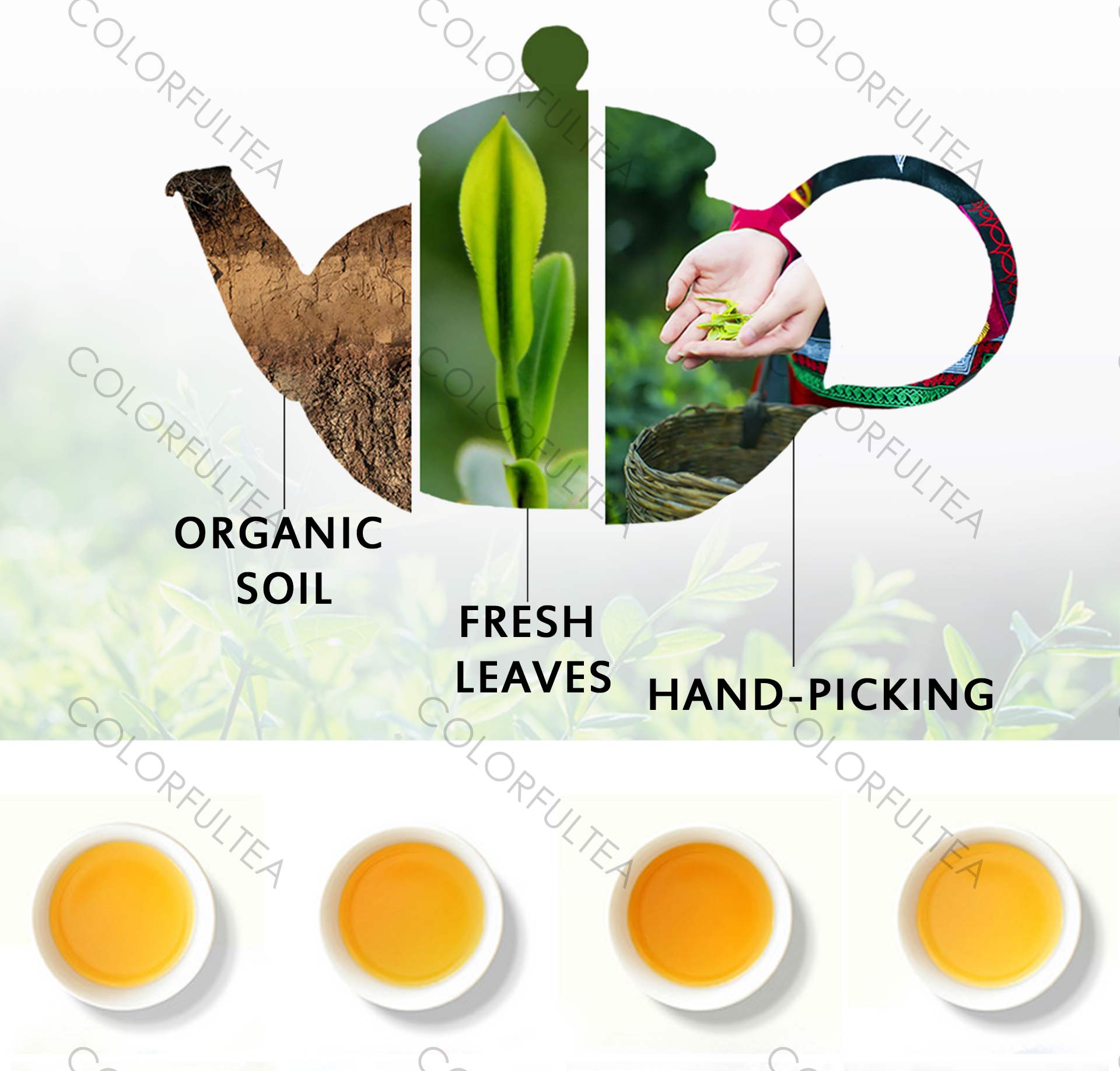
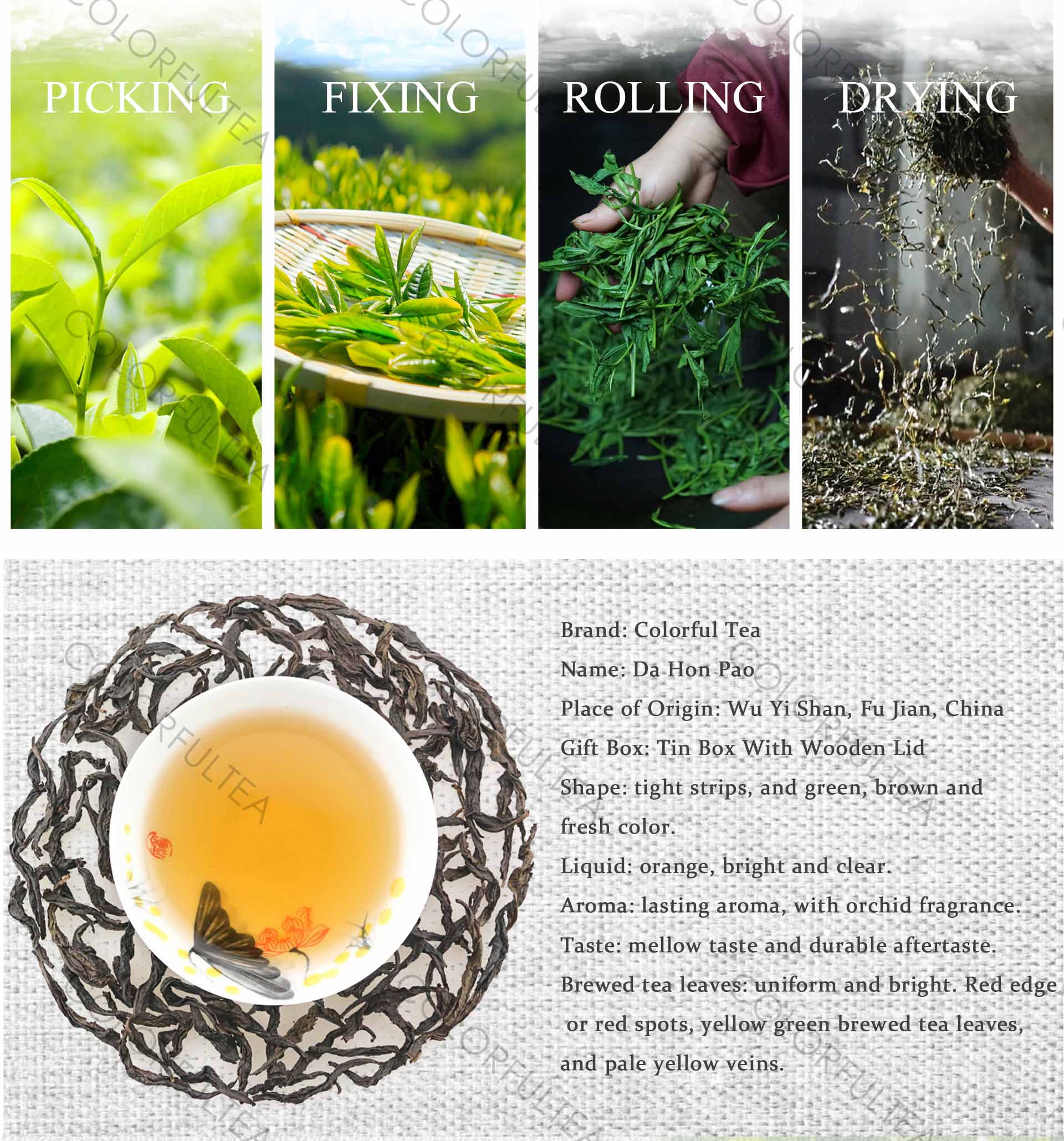
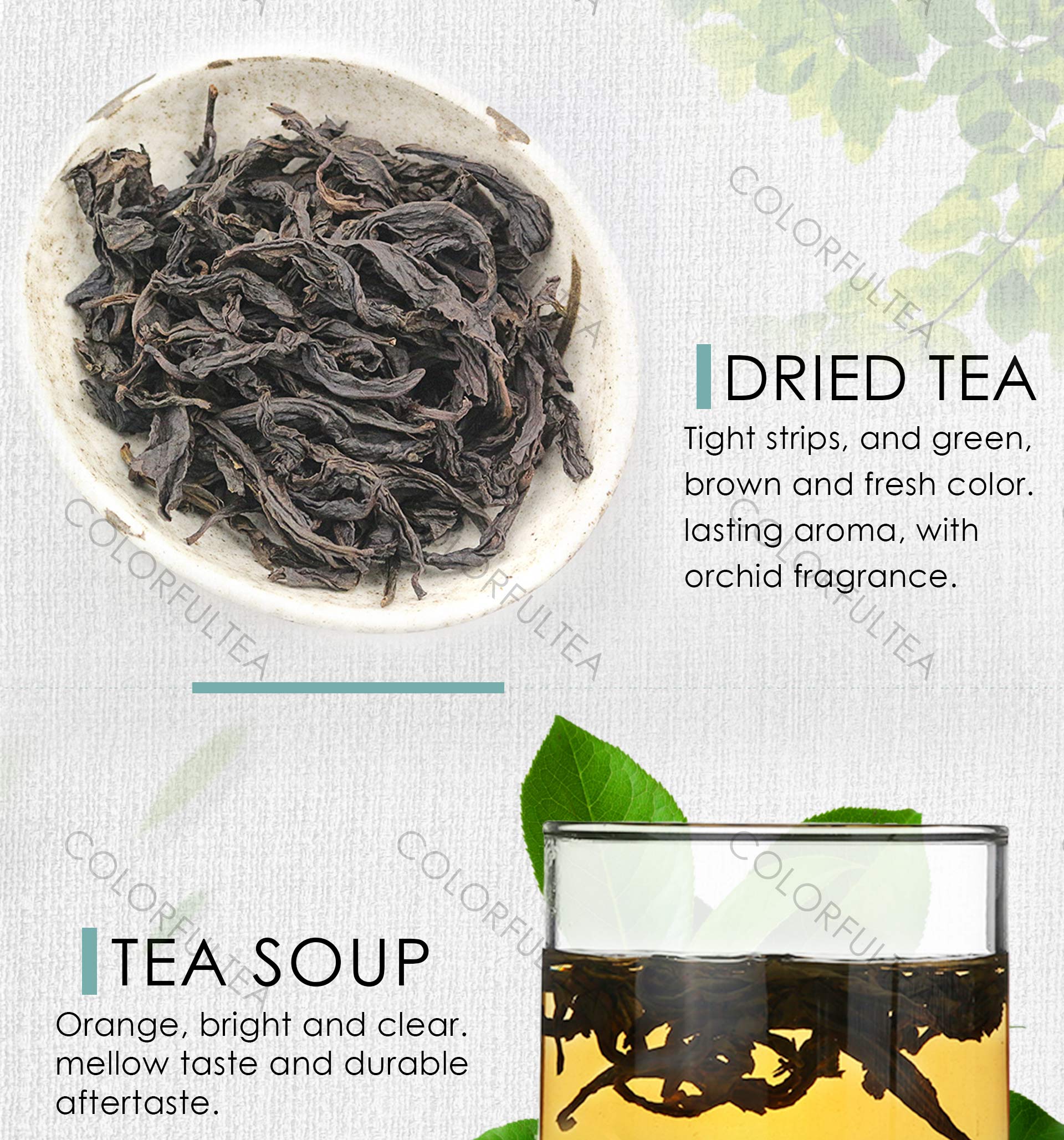
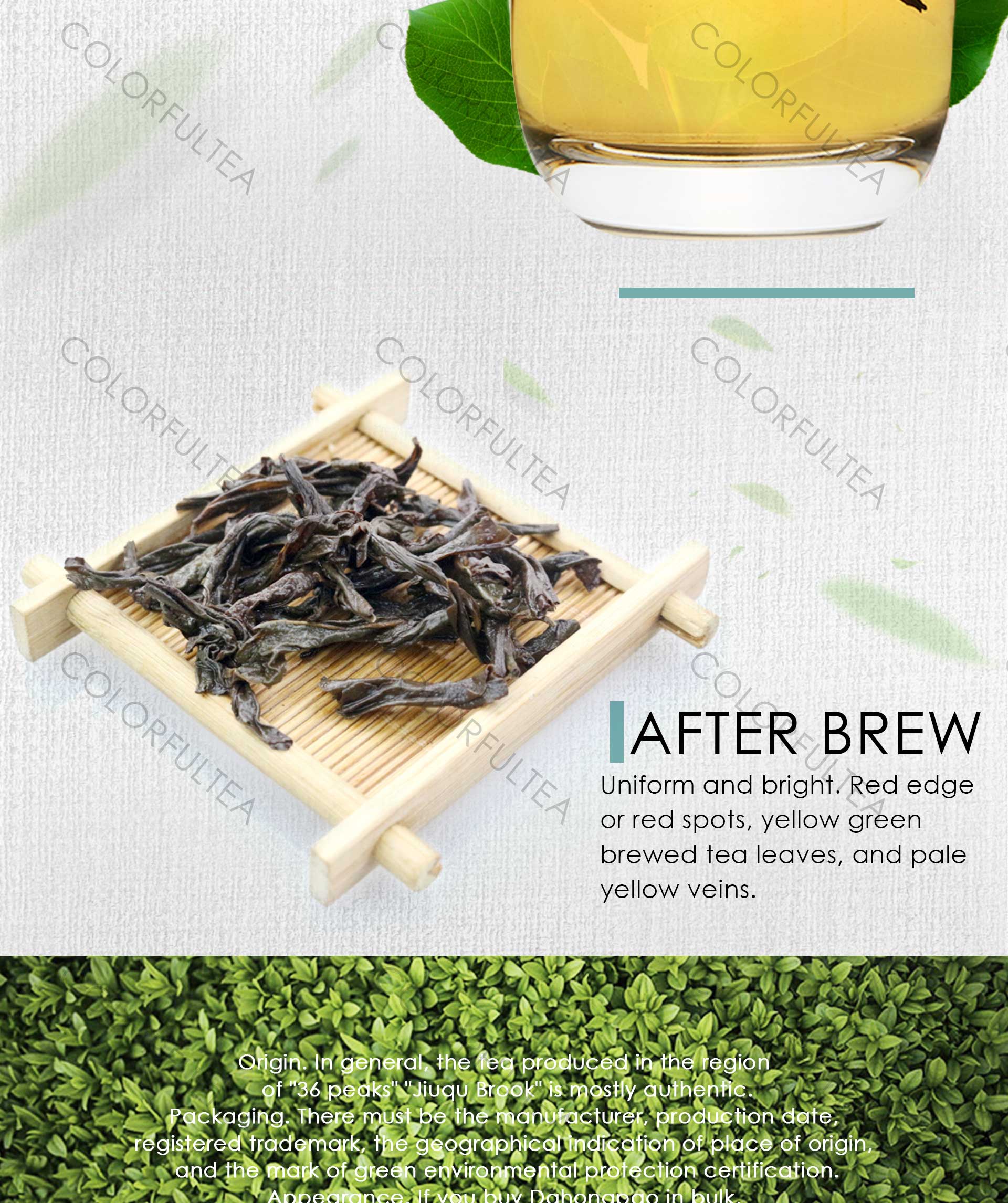
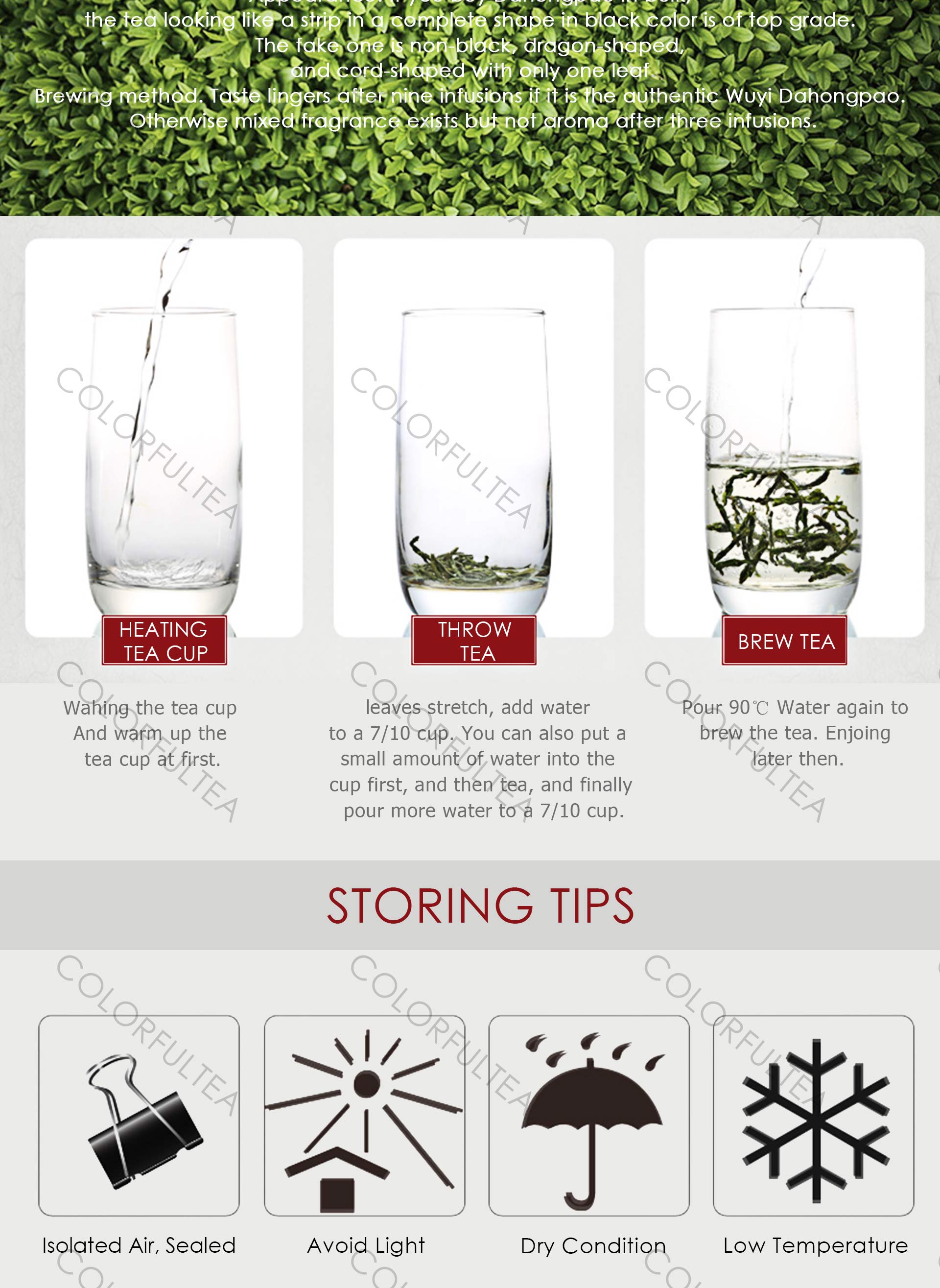
Top Teawares Store
Best Chinese Tea & Teawares Online Store Over 13 Years. Just be assured to purchase from us, all our products are high quality, noble and exquisite.
Shipping Information
We do offer Free Shipping and Express Shipping to worldwide.
- Free Shipping (8-12 Days): Normally, we will ship it by USPS or National Posts.
- Express Shipping (5-7 Days): Normally, we will ship it UPS, FedEx or DHL.
Express Shipping Cost is based on weight. Just add products to your cart and use the Shipping Calculator to see the shipping price.
Returns Policy
Zero Risk - Take Advantage of Our Free Return Policy.
We hope you have a pleasant shopping experience here, but if you are not satisfied and need to make a return, breathe easy. We do offer Free Return and Full Refund.
We have a 7-day return policy, which means you have 7 days after receiving your item to request a return.
Please contact us first for refunds before returning the items.






Cyber Monday Discount
All Items are Free Shipping
- Buy 2 Products or Above With 15% Discount.
- Buy 4 Products or Above With 20% Discount.
- Buy 6 Products or Above With 25% Discount.
- Buy 8 Products or Above With 30% Discount.
- This is Biggest Discount During Whole Year.
- The Discount is not Available for Tea Leaves, Big Tables and Furitures.
Note: The Discount will Auto Apply in Shopping Cart. Valid till 2024/12/03.

What Customers Are Saying












Mikemc Cartney"I ordered a tea warmer. Not only is it beautiful and functional, but the customer service I received was outstandingly good!"
Britteny Russo"I saw this gorgeous set on a YouTube video and swooned over it every time I saw it featured. I was so excited when I was able to find it here! It is absolutely stunning in person and I love that you can see the beautiful color of your tea through the glass. Gorgeous piece I’ll have for the rest of my life!"
Ashley Mason"Tea pot is gorgeous and came well packed and all in one piece and quickly."
Daniel McCormick"I ordered a Tea pet for my girlfriend, Umi tea was quick to ship my order. The package itself was very well boxed up, I can't think of a single complaint."
Jackie Russell"I was very pleased with the order service and our tea stand was exactly as advertised, a great authentic product."
Courtney Lasch"Great company. Love their products! They have such a neat selection of products and I love ordering from them. Can't find a lot of their products elsewhere. Good prices and quick customer service. Would recommend!"
Eden Rivera"The tea set I ordered made an amazing gift and it truly felt great. It made my mother happy and made me happy to see her enjoy her new tea set."
Liz Beekman"Received a beautiful yixing tea set in perfect condition. The people at Umi Tea are also very kind in assisting and answering any questions you might have about your prospective purchase."
Hill Samantha"Umi tea sets customer services is very helpful."
Joss Gardner"I bought an tea set on this website, and their packaging is very perfect with a gift box. The tea set is also very beautiful. Recommend buying."
Anthony Smith"I'm quite satisfied to the products that I received. They were as promised and delivered unharmed to my home."
Alberto Marche"I received the cup but unfortunately it was broken. I contacted the customer service, and they were really nice and welcoming. I discussed this issue with them, and they immediately sent me another cup. The cup arrived in perfect conditions. I really love my cup; I’m using it every day and I want to buy more. The cup is handmade, with high quality clay and beautiful design - definitely worth it. I would recommend Umi Tea Sets to everyone."
Reviews on Trustpilot
· Trustworthy Shopping Experience: Customers Good Reviews on Trustpilot.
· With 4.6 Ratting Score on Trustpilot.
· 300+ Customers Reviews in Total.
· 290 + Reviews are Five Stars.
· 16+ Reviews are Fours Stars.
Reviews on Resellerratings
· Verified by Resellerratings for Trusted Online Shopping.
· With 4.1 Ratting Score on Resellerratings.
· 200+ Customers Reviews in Total.
· 157 + Reviews are Five Stars.
· 30+ Reviews are Fours Stars.











